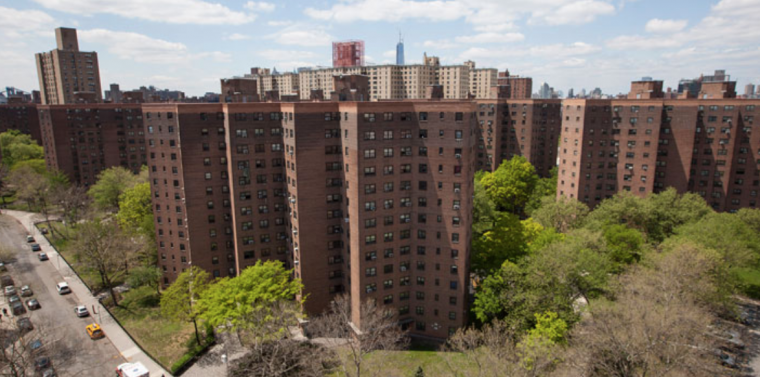
A New York City program that has privatized management and effective control of much public housing stock lacks adequate oversight and protections for residents’ rights, Human Rights Watch charges in a report issued Jan. 27. The 98-page report, ‘The Tenant Never Wins’: Private Takeover of Public Housing Puts Rights at Risk in New York City, examines the impact of the New York City Housing Authority (NYCHA) program called Permanent Affordability Commitment Together (PACT), which utilizes a federal program developed by the US Department of Housing & Urban Development (HUD) called the Rental Assistance Demonstration (RAD) to permit the semi-privatization of public housing.
Under PACT, which was launched in December 2016, NYCHA leases its public housing developments to private companies for 99 years, effectively privatizing management of the buildings. Human Rights Watch found that PACT conversions also mean the loss of key protections for residents, and may have contributed to increased evictions.
Public housing is a critical source of affordable housing for low-income New Yorkers, especially for people of color, older people, and people with disabilities. NYCHA’s public housing accounts for 57% of the units affordable to those with incomes below 30% of the area median, while making up just nine percent of New York City’s occupied rental housing stock. Given the chronic shortage of affordable housing in the United States, the need for public housing is immense. NYCHA’s public housing waiting list has over 160,000 applications, and those lucky enough to get off the “waitlist” can still wait over a year before being placed in an apartment.
Over the past decades, Congress has dramatically cut the budget for public housing, which relies heavily on federal funding. Funding for major repairs declined by 35%, in real terms, between 2000 and 2021, and funding for day-to-day operations and maintenance has been consistently insufficient to cover operating needs. As a result, NYCHA housing has gone from being of equal or better quality compared to similar private-sector housing to being plaguedby severe issues such as mold, peeling lead paint, and failing heat.
To compensate for chronic government underfunding, HUD created the RAD program, which allows local governments to “convert” public housing from Section 9 of the Housing Act to Section 8. This legal change enables the involvement of the private sector, and the ability to take out mortgages on the buildings. Many cities, including New York, have used RAD to significantly involve for-profit companies in the operation of public housing. These companies profiting from subsidies and tenant rents.
PACT has enabled NYCHA to secure financing for needed repairs at the cost of losing certain key protections for tenants, including provisions of a monitoring agreement between NYCHA and the federal government concerning oversight of conditions in NYCHA’s buildings. Many resident protections, including those obligating PACT managers to make repairs and meet federal Housing Quality Standards, are invoked in the contracts for PACT deals. But these contracts do not provide for residents’ rights to enforce these protections.
Human Rights Watch reviewed eviction data provided by NYCHA and found that, of the six PACT developments that converted before 2020, when an eviction moratorium was enacted, evictions increased in two large PACT conversions that together house 6,500 people. One of these developments, Ocean Bay in Far Rockaway, Queens, was NYCHA’s inaugural PACT conversion. Between 2017 and 2019, it had an eviction rate more than three times higher than the NYCHA average. They “put you out faster,” one Ocean Bay resident told Human Rights Watch.
Evictions also increased post-conversion at the Betances Houses in the South Bronx. NYCHA plans to place 62,000 units, or one-third of its 175,000 apartments, under PACT management. To date, NYCHA has thusly converted 11,000 apartments.
New York City and New York State should update their eviction laws to conform with international human rights standards, which prohibit evictions that place tenants at risk of homelessness or of other rights violations, Human Rights Watch said. Nationally, Congress should fully fund public housing to ensure that local governments are able to maintain this critical resource, HRW further urged. (HRW, The City, Save Section 9)
Photo via NYS Senate





NYS authorities failed to investigate housing discrimination
An audit by the state of New York released Oct. 15 found the state’s Division of Human Rights (DHR) failed to investigate numerous housing discrimination complaints. The audit stated that the failure to investigate was due to “poor management” at the agency, with complaints regularly lost or left unprocessed.
Key findings of the audit showed DHR initially failed to account for 68% of sampled complaints. Additionally, of complaints located by the agency, nearly half took longer than 30 days to receive a response, and 69% waited over 100 days for an resolution. In cases where complaints were closed following a DHR investigation, 70% did not include evidence that appropriate regulations were followed.
The New York State Comptroller, in charge of auditing state agencies, stated the failures breached agency procedures. Specifically, Section 297(2)(b) requires DHR to initiate an investigation within 30 days of a complaint and notify the respondent of the outcome of the investigation within 100 days.
To correct the issues at DHR, the Comptroller’s Office recommended three actions. First, it should establish “adequate internal controls.” This would include the development of “comprehensive written procedures” and the institution of strict control on tracking time and efforts expended on cases. Second, the Comptroller recommended that officials improve oversight of time management procedures and investigatory processes. Third, the agency should institute a processing system that ensures all complains are investigated in the order in which they were received.
The acting commissioner of DHR, Denise Miranda, thanked the Comptroller’s office for the audit’s “insights and professionalism.” However, she defended the agency’s work by highlighting that that audit occurred from 2019-2024, including years during COVID-19.
DHR was created to enforce the state’s human rights law. The mission of the agency is to ensure that “every individual…has an equal opportunity to participate fully in the economic, cultural and intellectual life of the State.” (Jurist)